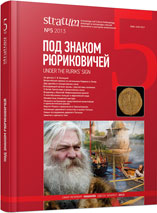О клятвах русов и славян
About Oaths of Rus’ and Slavs
Author(s): Oleg Lvovich GubarevSubject(s): History, Cultural history, Middle Ages, 6th to 12th Centuries, History of Religion
Published by: Издательский дом Stratum, Университет «Высшая антропологическая школа»
Keywords: Ancient Rus'; Scandinavia; Middle Ages; Varangians; Slavs; oaths; Russian-Byzantine agreements; chronicles; sagas
Summary/Abstract: The earliest Russian chronicle (The Tale of Bygone Years) includes accounts about treaties being concluded between Rus’ and Byzantium, as well as texts of surviving treaties concluded in 907, 912, 945 and 971. Historians and philologists focused on the language and content of these diplomatic documents, and also pointed out a specific and recurrent motif, that is weapon-oath of the pagan Rus’.The full text of one such oath was included in the agreement of 945. For perjurers, be they baptized, the oath calls on “the wages of the God Almighty and ban to ruin in one’s after-life”, and be they pagan, it calls on a ban condemning one to deprivation of support from either Christian or pagan supreme forces (“may they receive help neither from God nor from Perun”), death by their own weapons and eternal bondage in their after-life. We find similar themes of punishment of perjurers by their own weapon in Scandinavian sagas. Some researchers suppose that Rus’ originates from the Baltic Slavs, but for them, as Saxo Grammaticus says, the oath is sworn by hurling a stone into water. So, we should add the weapon-oath from the treaties between the Rus’ and the Greeks to the already known correspondences between the accounts of the Rus’ in “The Tale of Bygone Years” and motifs found in sagas.
Journal: Stratum plus. Археология и культурная антропология
- Issue Year: 2013
- Issue No: 5
- Page Range: 239-245
- Page Count: 7
- Language: Russian
- Content File-PDF

